With the sun barely surfaced in Guadeloupe, Peter loads his camera, video camera and tripod into the boot of the car. After over an hour’s drive, we arrive in St-François, on the so-called Grande-Terre section of the island, to track down a very special class…
These students, which the crew of the Race For Water vessel welcomed on-board back in September, are in charge of preserving a beach. Indeed, just a matter of months ago, with the school year just beginning, they got a handle on the mission entrusted to them: campaigns to raise awareness among local inhabitants about the pollution, regular collections of waste and contact with town halls would become part of the daily routine for the children involved. After four months at school, what have they achieved?
As we creep into this little school enveloped in lush greenery, someone tells us where we can find the class. Having barely set foot inside, Peter unpacks his gear, sets up his video camera and films the children. There isn’t a sound and the children look at us in stunned amazement, slightly uncomfortable about this morning intrusion. Midway through her lesson on ‘marine advice’, the teacher smiles and then explains how the lesson will play out: “Twice a week, we discuss the action we wish to undertake on our beach in order to preserve this fragile ecosystem”, explains Yanni Bardail, Director of the school and Head of the class.
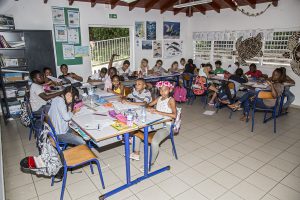
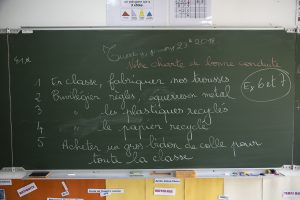
During school, the children discuss how to preserve their beach before acting on the field
Among the class’ upcoming actions is the grand unveiling of their notices to raise awareness about preserving the environment, which will be posted up along the beach. “We also visit our beach to chat with the people that go walking there. Sometimes, when we offer someone advice, they take it badly and don’t want to listen to us! Fortunately, that’s not often the case”, explains Basile, 10. “We also wrote to Mr President Emmanuel Macron!”, adds Océane, 9. Somewhat amused, the Director explains to us that any decision is democratic here and that the majority of students wanted to invite the latter to the official inauguration of their signs. In addition to these actions, the children have collected rubbish, sorted it and counted it before creating graphs from the information and using them during maths lessons. “What we do out in the field is useful to what they learn in class and it motivates them”, says Yanni Bardail. “Visiting the Race for Water vessel was a revelation for these children”. Touched to learn that their mission to combat plastic pollution was being defended and undertaken by others, they were keen to find out more about energy-related topics and get a grasp of what hydrogen was. “In light of all their questions, I asked a chemistry teacher to come into class and we manufactured our own hydrogen”, the Director tells us.
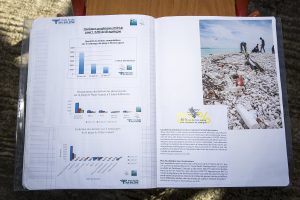
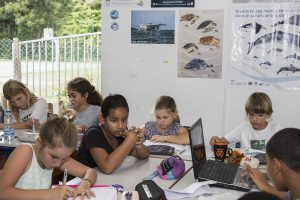
Collecting plastics and Learning statistics with it !
To date, there are 8 such classes in Guadeloupe and other requests to participate in this type of programme are coming in from all over the island. “If I had to say one thing to the Race For Water teams, it would be thank you. For the hope they give us, for their motivation and for their action”, concludes the Director. The students back up this sentiment. “This planet is ours and if we don’t take action we won’t be able to live here in the proper manner when we’re grown up. It’s very important”.
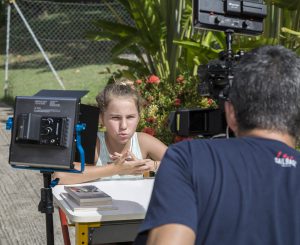
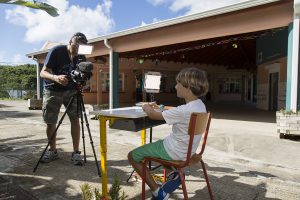
In interview with Peter, children speak about their convictions